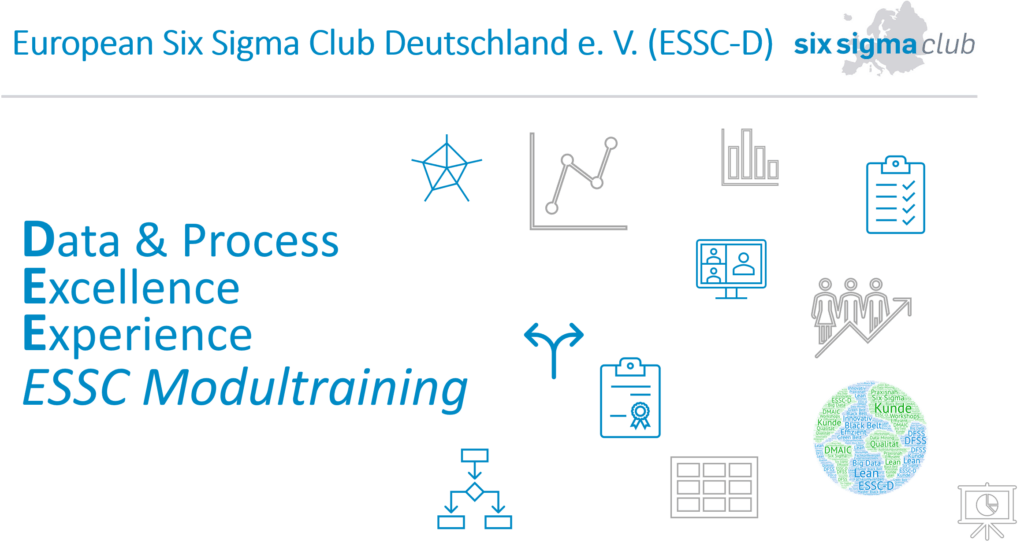Data & Process Excellence Experience
- ESSC module training -
Aims and structure of the ESSC module training courses
The ESSC training modules offer a comprehensive training opportunity for specialists and managers in the areas of data analysis, statistics and operational excellence. The modules are designed to teach practical methods that can be applied immediately in companies. Participants not only learn theoretical concepts, but also how to put them into practice in order to act as internal contacts and experts in their organizations.
The program is aimed at Black Belts, Master Black Belts, data analysts, quality managers and executives who want to optimize data-based decision-making processes and deepen their methodological skills.
Each module was developed with the aim of providing participants with sound knowledge and the ability to confidently apply the methods taught. In addition to the pure transfer of knowledge, the focus is on the interpretation of results and the independent use of statistical and analytical tools.
Structure of the modules
The training program consists of eight independent modules that can be booked individually. The modules include theoretical content as well as practical exercises, case studies and interactive group work to ensure a lasting understanding.
The modules are initially offered as online training courses via Zoom to enable flexible participation. Depending on requirements, face-to-face training or hybrid formats can also be organized.
Modules
1️⃣ Fundamentals of Statistics & Data Analysis (Refresher & Advanced)
2️⃣ Design of Experiments (DoE)
3️⃣ Statistical Modeling & Machine Learning
4️⃣ Advanced Statistics for Master Black Belts
5️⃣ Service Life & Reliability Analysis
6️⃣ Soft Skills for Six Sigma Projects
7️⃣ Roll-Outs & Implementation
8️⃣ Methods of Operational Excellence

Who is this training for?
- Data analysts & quality managers who want to develop their skills.
- Black Belts & Master Black Belts who want to deepen their methodological competence.
- Managers & people interested in OPEX who want to establish innovative approaches.
- Trainers & coaches who want to expand their training skills.
- High flyer

ESSC Master Black Belt Certification
Each module of the Data & Process Excellence Experience training has a value of 2 points. A total of 8 points are required for the ESSC Master Black Belt (MBB) certification, which can be earned by participating in four freely selectable modules. This structured further training offers the ideal opportunity to further develop your methodological skills and to design the path to MBB certification in a targeted manner. The contents of these modules form an important part of the ESSC Master Black Belts guidelines(LINK to our training guidelines).
Crediting of existing qualifications
Existing qualifications can be credited in consultation with the ESSC Senior Master Black Belt (SMBB). The 8 points required for MBB certification can of course also be acquired through a combination of modules and proven experience.
A brief overview of all modules and their contents
Get to know the modules of the Data Excellence Experience
Here we present selected training modules that have been developed as part of the Data Excellence Experience.
This offer is backed by an experienced team of trainers and the European Six Sigma Club Deutschland e.V. – for in-depth knowledge, practical content and sustainable implementation expertise.
Look forward to compact insights, concrete added value and new perspectives for your data-driven process world!
Module 1: Fundamentals of statistics & data analysis (refresher and in-depth study)
Participants learn how to apply statistical methods with confidence, interpret results and act as an internal contact person for data-based decisions.
Core content of this module:
➡ Introduction to statistical methods for process analysis and quality control – practice-oriented.
➡ Explorative data analysis and visualization, e.g. with boxplots, histograms, scatterplots.
➡ Hypothesis tests such as t-test and ANOVA using concrete examples with interpretation.
➡ Simple and multiple linear regression for predicting target variables.
➡ Dealing with non-normally distributed data, including transformations for tests and modeling.
➡ Measurement system analyses (MSA), also attributive and with image processing, e.g. camera systems.
➡ Process capability analyses and tolerance intervals, including Cp, Cpk, Pp, Ppk – for normally and non-normally distributed processes.
Trainer: Eugen Alexandrov
Dates (ONLINE)
- Block 1 (6h): 06.06.2025, from 08:00 to 14:30
- Block 2 (5h): 13.06.2025, from 08:00 to 13:30
- Block 3 (5h): 27.06.2025, from 08:00 to 13:30
Module 2: Experimental Planning & Design of Experiments (DoE)
Participants develop a firm understanding of the structure, implementation and evaluation of test plans. They will be able to recognize typical pitfalls, optimize experiments and effectively support teams in their practical implementation.
Core content of this module:
➡ Basics of full and partial factor experimental designs – structure, analysis and interpretation (refresher).
➡ Understanding and dealing with alias structures in order to correctly interpret interactions.
➡ Test planning with selectivity analysis to specifically control the effort.
➡ Use center points specifically to check non-linearities and reproducibility.
➡ Impact area and extended DoE methods such as RSM, D-optimal or definitive screening designs.
➡ Select and apply special DoE forms such as mixing and Taguchi test plans.
➡ Strategies for failed attempts and incomplete data – robust planning and flexible adaptation.
Trainer: Achim Schmidt
Dates (ONLINE)
- Block 1 (4h): 30.09.2025, from 08:30 am to 12:30 pm
- Block 2 (4h): 02.10.2025, from 08:30 am to 12:30 pm
- Block 3 (4h): 08.10.2025, from 08:30 am to 12:30 pm
- Block 4 (4h): 10.10.2025, from 08:30 am to 12:30 pm
Module 3: Statistical Modeling & Machine Learning
Participants acquire in-depth knowledge of modern data modeling, are able to integrate ML methods into their work in a meaningful way and support data-driven decisions for process improvements.
Core content of this module:
➡ Multivariate methods and classical regression models (refresher) to refresh statistical basics.
➡ Introduction to data orchestration and machine learning – understanding supervised and unsupervised learning.
➡ Model setup with KNIME®, Minitab® and Python, including data preparation, feature engineering and validation.
➡ Classification and regression methods such as decision trees, Naive Bayes or neural networks.
➡ Differences between classical and ML-based models, including fields of application and limitations.
➡ Practical application of ML methods for process optimization, including visualization and interpretation.
➡ Confident handling of model quality, cross-validation and model comparison for well-founded decisions.
Coaching team: Maik Kschicho, Björn Noreik
Dates (ONLINE)
- Block 1 (8h): 08.10.2025, from 08:00 to 17:00
- Block 2 (4h): 09.10.2025, from 08:00 am to 12:00 pm
- Block 3 (4h): 30.10.2025, from 08:00 a.m. to 12:00 p.m.
Module 4: Advanced Statistics for Master Black Belts
Participants significantly expand their statistical expertise and learn how to solve complex problems analytically in practice. They gain confidence in the selection, application and interpretation of advanced statistical methods and are able to communicate these in a target group-oriented manner.
Core content of this module:
➡ In-depth study of special regression methods such as binary and Poisson regression for analyzing countable and dichotomous data.
➡ Discriminant analysis and cluster methods to recognize group differences and make structures visible.
➡ Principal component analysis and dendrograms for dimension reduction and exploratory analysis.
➡ Multivariate quality control charts for monitoring multidimensional process variables.
➡ Non-parametric tests and their use when classical prerequisites are violated.
➡ Time series analysis with ARIMA models, reliably identify trend and seasonal effects.
➡ Idea of simulation techniques such as Monte Carlo and discrete models to make robust decisions in the face of uncertainty.
Trainer: Daniel Fügner
Dates (ONLINE)
- Block 1 (4h): 19.09.2025, from 08:00 am to 12:30 pm
- Block 2 (4h): 22.09.2025, from 08:00 am to 12:30 pm
- Block 3 (4h): 24.09.2025, from 08:00 am to 12:30 pm
- Block 4 (4h): 26.09.2025, from 08:00 am to 12:30 pm
Module 5: Service life and reliability analysis
Participants learn modern methods for evaluating and safeguarding product reliability. They will be able to evaluate service life data in a targeted manner, plan tests efficiently and act as internal experts for service life and reliability issues.
Core content of this module:







Trainer: Barbara Bredner
Dates (ONLINE)
- Block 1 (4h): 09.09.2025, from 09:00 to 13:00
- Block 2 (4h): 16.09.2025, from 09:00 to 13:00
- Block 3 (4h): 23.09.2025, from 09:00 to 13:00
- Block 4 (4h): 30.10.2025, from 09:00 to 13:00
Module 6: Soft skills for Six Sigma projects
Participants strengthen their communication and moderation skills and gain confidence in dealing with complex group situations. They will not only be able to apply Six Sigma methodological tools with confidence, but will also be able to lead and support project teams competently.
Core content of this module:







Trainer: Ole Fischer
Dates (ONLINE)
- Block 1 (8h): dd.mm.2025, from 08:00 to 17:00
- Block 2 (8h): dd.mm.2025, from 08:00 to 17:00
Module 7: Roll-outs & implementation
Participants learn how to efficiently plan, roll out and anchor improvement projects under real-life conditions. They strengthen their ability to manage change processes and can act as strategic multipliers for excellence methods.
Core content of this module:







Trainer: Michael Ohler
Dates (presence, 22880 Wedel)
If you would prefer to attend this module online, please let us know.
- Block 1 (8h): 10.07.2025, from 08:00 to 17:00
- Block 2 (8h): 11.07.2025, from 08:00 to 17:00
Module 8: Methods of Operational Excellence
Participants receive a broad methodological toolbox for shaping operational excellence. They learn how to combine different approaches in a meaningful way depending on the situation, use digital tools and act as a methodical sparring partner within the company.
Core content of this module:







Trainer: Thomas Freudemann
Dates (ONLINE)
- Block 1 (4h): 15.10.2025, from 08:00 am to 12:00 pm
- Block 2 (4h): 29.10.2025, from 08:00 am to 12:00 pm
- Block 3 (4h): 12.11.2025, from 08:00 am to 12:00 pm
- Block 4 (4h): 26.11.2025, from 08:00 am to 12:00 pm

